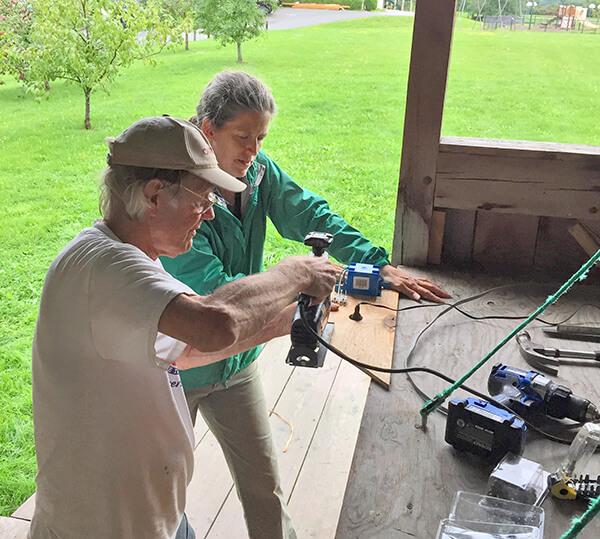Rebecca Foster: Bringing her focus on climate change to the Charlotte Energy Committee
In 2012, Rebecca Foster held a celebration for the completion of a community solar project at Ten Stones where she resided. That’s when Suzy Hodgson, who was serving as chair of the Charlotte Energy Committee (CEC), invited her to become a member of the committee and she accepted. After spending a few years co-chairing with Hodgson, Foster became the sole CEC chair two years ago.

Foster is proud of the CEC’s most recent accomplishments, one of which is a new website. The committee still has some pages on the town site, but having their own location gives them the opportunity to provide the public with more information. Not only is Foster pleased with the outcome, but she is also tickled by how the project came to fruition. Two interns from Oberlin College were paid by the college to work on the site. “It was great for them, and it was great for us,” Foster said. “We probably would have been able to do it on our own, but it wouldn’t have come out the same way because we’re all very busy and it takes a lot of time to put together a new site.” Foster said the committee really enjoyed interacting with young people who were excited about their mission. “Nobody met in person,” she said, “but we created this wonderful thing online.”
Another recent CEC accomplishment is a dual-use demonstration project. “There’s a movement in renewable energy to say we can use the land for two things at least,” Foster said. “It doesn’t have to be just solar panels. We can also have pollinator beds or sheep.” To showcase the idea of dual use, the CEC put an off-grid, 100-watt solar panel on the roof of a compost shed at Charlotte Central School. “The shed was already there,” Foster said, “and it’s been part of the curriculum for enhancing the whole farm-to-table idea, growing vegetables and putting compost waste in the shed. It’s been a teaching tool for the school.” The work required the assistance of a local engineer, who connected the panel to an inverter and battery. Now there is an outlet for members of the school community to charge their phones, laptops or even electric bicycles.
The Charlotte Energy Committee recently received a $1,500 grant from the Vermont Council on Rural Development’s Climate Catalysts Innovation Fund for their energy shelf project. The project was born in 2015 and revived in a different form this year with the goal of connecting lower-income households with weatherization resources. The Charlotte Food Shelf helps with outreach since those who are served by the food shelf are also eligible for weatherization assistance. “It’s challenging to do outreach with volunteers,” Foster said. “We used the money to hire a community consultant to help us. She just started, but the intention is to have her connect people to existing free virtual energy tours and make sure everyone knows we have DIY weatherization materials.”
Foster doesn’t have a background in energy or science. She’s an art historian and author, specializing in American modernism, with emphasis on her grandfather, Harold Weston. “The legacy I’ve inherited from him—a conviction in the transcendent qualities of the natural world— is directly related to my deep concern about climate change, and thus, my small effort to do what I can through the Town Energy Committee,” she said.
Since Charlotte is an agricultural community, Foster would like to see other methods of working toward a better climate future, including carbon sequestration. She feels strongly about having the CEC collaborate with other committees, as well as other towns. As an example, she noted that the Trails Committee and the CEC have “a harmony of interest and purpose” regarding the way people move around town. “There are so many different areas where we can work with others” she said. “I just wish we had twice as many people on the Energy Committee.”
Foster noted that if there was a theme to the CEC’s actions in 2021 it was working with other people, including the two college interns and the new consultant. Since most members of the committee are over 50, it was exciting to have those youthful additions to the group. “I know there are many people in Charlotte who are deeply concerned and motivated to gracefully enter into a future where we have more balance in our energy consumption and production,” Foster said. “I’m hopeful there will be more support at the decision-making level.”


